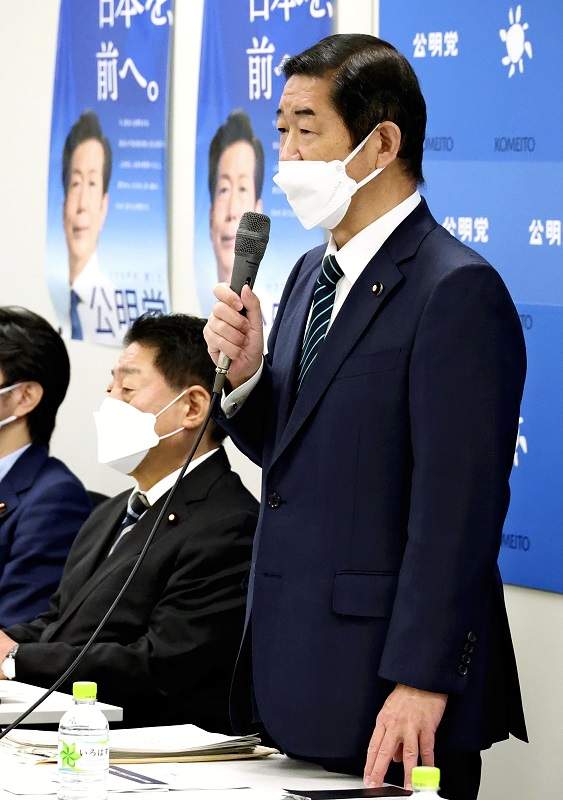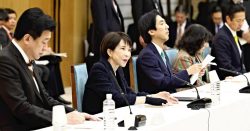
Shigeki Sato, head of the Komeito Research Committee on Foreign Affairs and National Security, addresses a meeting of the committee at the Diet on Thursday.
21:00 JST, December 2, 2022
In a major change, ruling coalition party Komeito has demonstrated a more pragmatic line on security policy and broadly agreed on the need for Japan to possess counterstrike capabilities.
Komeito previously had been cautious about any moves to bolster Japan’s defense capabilities, but an attitude shift is emerging mainly among the party’s younger and midranking Diet members and supporters amid the nation’s increasingly severe security environment.
The decision to broadly support possession of counterstrike capabilities was made at a meeting of the party’s Research Committee on Foreign Affairs and National Security Thursday.
“We clarified that [possessing counterstrike capabilities] would be part of exercising the right of self-defense, and we confirmed that the principle of using the minimum extent necessary would be upheld,” Masakazu Hamachi, secretary general of the committee, said to reporters after the meeting.
Some attendees at the meeting expressed concern about whether Japan could actually conduct a counterstrike at a stage when the nation had not been attacked, and whether such actions could be confused with a preemptive attack that would violate international law. However, Hamachi and other Komeito officials settled the discussion by explaining that any counterstrike would “be decided based on the international situation and other factors.”
The government presented Komeito with its opinion on counterstrike capabilities, which stated that international law and the principle of an exclusively defense-oriented policy based on the Constitution would be respected, and that current procedures requiring Diet approval under the “three new conditions” for the use of force for self-defense will be upheld. Komeito decided that fully adhering to these general principles would act as a “brake” and went ahead with approving the possession of counterstrike capabilities.
The three conditions, which the Cabinet approved in July 2014, are that an armed attack threatens Japan’s survival, that there are no other appropriate means to repel the attack, and that the use of force is kept to the minimum necessary.
Many veteran Komeito lawmakers, including vice representative Kazuo Kitagawa, had initially been adamant in demanding clarification on how it would be decided whether an enemy attack had started before they would approve any change in position. Ultimately, the party itself did not stick to this stance.
The Liberal Democratic Party, Komeito’s coalition partner, was reluctant to make such a clarification, saying that revealing all those details would “harm the nation’s deterrence.” This view gained increasing traction among young and midranking Komeito lawmakers.
“If we regard ourselves as a party of peace, we need to hold realistic discussions on how we can protect peace,” one young Komeito lawmaker said.
When security-related legislation was passed in 2015, Komeito maintained a distinctly cautious stance in consideration of pushback from within the party. Komeito demanded, among other things, that any overseas dispatch of Self-Defense Forces personnel would require prior Diet approval “without exception.”
When asked to explain Komeito’s change in position, a senior party official said, “Russia’s invasion of Ukraine and increased tensions over Taiwan have created a more positive view toward strengthening defense capabilities among the party’s supporters, including members of Soka Gakkai.”
Soka Gakkai is a religious organization and a key supporter of Komeito.
Top Articles in Politics
-

Japan PM Takaichi’s Cabinet Resigns en Masse
-

Sanae Takaichi Elected Prime Minister of Japan; Keeps All Cabinet Appointees from Previous Term
-

Japan’s Govt to Submit Road Map for Growth Strategy in March, PM Takaichi to Announce in Upcoming Policy Speech
-

LDP Wins Historic Landslide Victory
-

LDP Wins Landslide Victory, Secures Single-party Majority; Ruling Coalition with JIP Poised to Secure Over 300 seats (UPDATE 1)
JN ACCESS RANKING
-

Producer Behind Pop Group XG Arrested for Cocaine Possession
-

Japan PM Takaichi’s Cabinet Resigns en Masse
-

Man Infected with Measles Reportedly Dined at Restaurant in Tokyo Station
-

Israeli Ambassador to Japan Speaks about Japan’s Role in the Reconstruction of Gaza
-

Videos Plagiarized, Reposted with False Subtitles Claiming ‘Ryukyu Belongs to China’; Anti-China False Information Also Posted in Japan
























